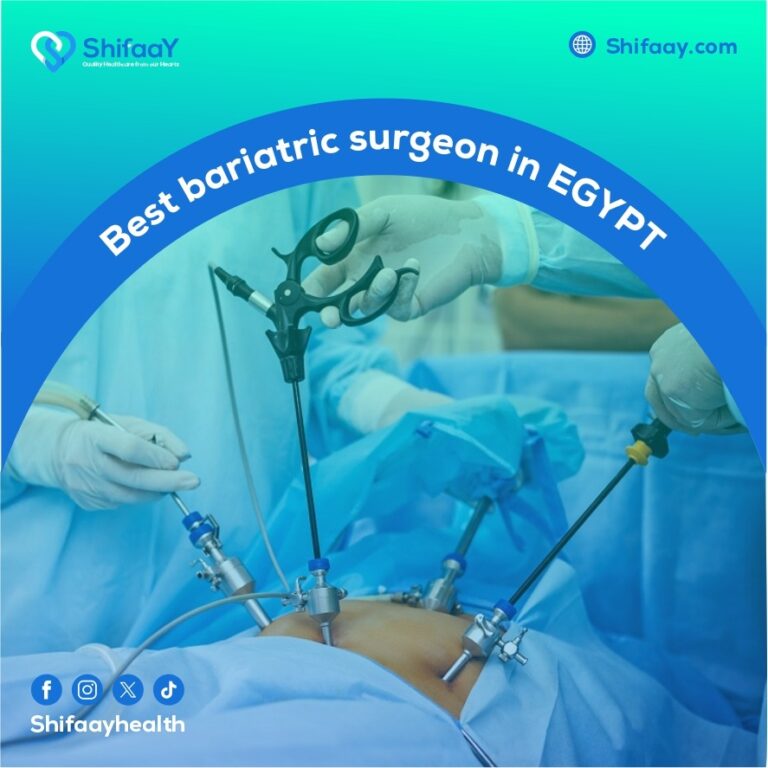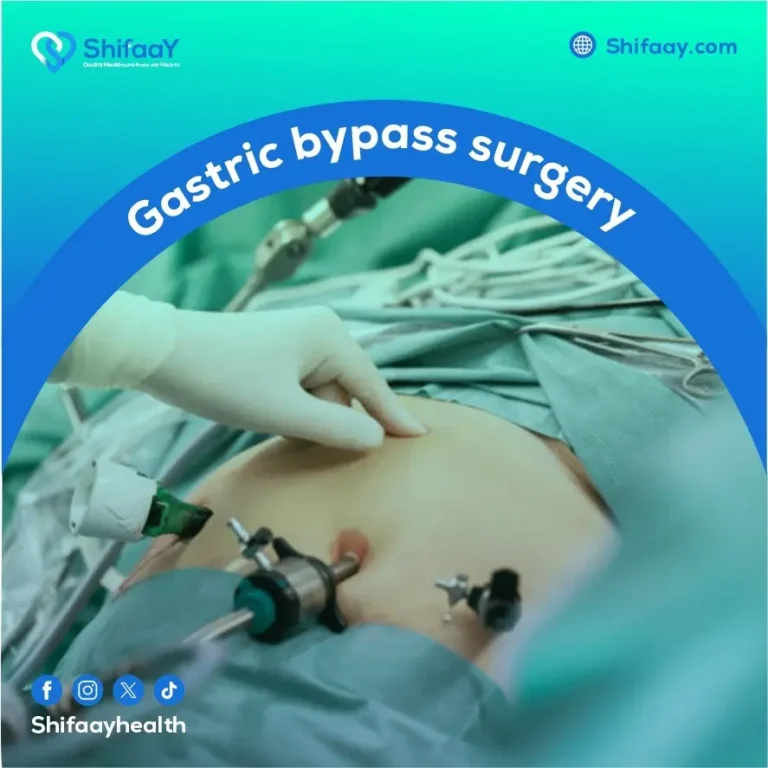Gastric Band Surgery
The cost of gastric band surgery in Egypt has become a key focus for many individuals seeking effective and fast medical solutions to eliminate excess weight and adopt a healthy, balanced lifestyle. This is due to the tangible results this procedure offers in a very short period, especially when compared to traditional diets or intensive exercise routines. It is considered one of the relatively simple surgical procedures, primarily aimed at reducing the size of the stomach, thereby limiting the amount of food a person can consume throughout the day. This, in turn, promotes gradual and safe weight loss.
One of the main advantages of gastric band surgery is that it is adjustable and reversible, offering patients significant flexibility in controlling the outcomes based on their response and weight loss progress. Additionally, the procedure does not require any drastic changes to the digestive system, making it an ideal option for many people who are looking for effective medical solutions without undergoing more complex surgeries such as gastric sleeve or gastric bypass. Moreover, the recovery period after surgery is usually relatively short, enabling patients to return to their normal lives quickly, provided they follow a balanced diet and receive regular medical supervision to ensure long-term success.
With the increasing number of specialized medical centers offering bariatric surgeries—especially gastric band surgery—at competitive prices and exceptional quality, it has become easier for all patients to undergo the procedure within Egypt, without the need to travel abroad. This significantly reduces the overall cost.
Shifaay Healthcare Center is considered one of the leading medical tourism companies in Egypt that offers this type of surgery with a high level of professionalism. It combines medical excellence, modern technology, and affordable prices suitable for all categories. The center also provides a wide range of integrated medical consultations before and after surgery, in addition to nutritional and guidance follow-up programs that help patients maintain their results safely and confidently—making it a unique and ideal option for a large group of individuals suffering from severe obesity.
Gastric Band Surgery Cost in Egypt

Egypt is considered one of the top medical tourism destinations preferred by a large number of individuals suffering from overweight and seeking effective medical solutions for severe obesity. The country is home to a distinguished group of obesity specialists with extensive experience in performing gastric band surgery, and who are always committed to utilizing advanced medical technologies that can significantly contribute to the success of such procedures while ensuring safe and effective outcomes for the patient.
In addition, Egypt boasts a large number of leading medical centers equipped with the latest devices and healthcare facilities, ensuring comfort and safety for patients throughout the treatment period. Among the most prominent of these centers is Shifaay Healthcare Center, which has become the top destination for many people looking for effective treatment for morbid obesity at a cost that is more affordable compared to other countries.
Shifaay is one of the most prominent medical centers specializing in bariatric surgeries in Egypt. This center is known for offering a wide range of outstanding medical services that meet high-quality standards, provided by a team of professional and highly experienced surgeons specialized in gastric band surgery. They utilize the latest medical techniques such as laparoscopic surgery, which ensures minimal invasiveness and faster recovery times. The team also focuses on creating a safe and comfortable medical environment for patients, along with providing full healthcare support through pre- and post-operative tests and assessments, ensuring a comprehensive treatment experience from initial consultation to post-surgery follow-up.
The cost of gastric band surgery in Egypt depends on several important factors, most notably the experience of the surgeon performing the procedure, which plays a key role in determining the overall cost. Generally, the more experienced and successful the surgeon, the higher the cost. Additionally, the quality of healthcare services provided—including the level of nursing, the efficiency of the medical staff, and the range of services before and after the procedure—can also affect the price.
Moreover, the type of technique used during the surgery influences the cost as well. Modern techniques such as laparoscopic gastric banding require advanced equipment and specialists trained in these methods, which typically leads to a higher cost compared to traditional approaches.
In general, the cost of gastric band surgery in Egypt usually starts at approximately 30,000 EGP, but this price may vary from one patient to another depending on the aforementioned factors.
Read aslo: Gastric Sleeve Surgery Cost in Egypt
My Experience with Gastric Band Surgery
My experience with gastric band surgery was not just another routine medical procedure—it was a true turning point in my life. What makes this journey especially meaningful is my decision to share it with you, knowing full well that many people today are living the same struggles I once faced: a constant battle with excess weight, low self-confidence, and ongoing frustration despite countless efforts.
My journey began at one of the most prominent and specialized medical centers for this type of surgery—Shifaay Center. It was the place that gave me hope before a solution, support before the procedure, and results before promises. What attracted me to this center from the very first moment was their genuine attention to the details of my case, precise medical consultation, and exceptional care—completely free from marketing gimmicks or exaggeration. I truly felt I was in safe hands.
I had always suffered from morbid obesity, which severely impacted both my physical health and mental well-being. Neither diets nor workouts brought any tangible results. That’s when the medical recommendation came: to undergo gastric band surgery as a safe and effective solution for my condition. After the initial tests and both psychological and medical preparations, the surgery date was set.
I won’t deny that I felt a bit anxious and nervous at first. However, the expert and pioneering medical team at Shifaay made every effort to provide me with comfort and reassurance at every stage. As for the surgery itself—it was quicker than I had expected, and the recovery period was smooth thanks to the meticulous follow-up and personalized nutritional guidance.
Today, months after my gastric band surgery in Egypt, my life has completely transformed. I’ve lost a significant amount of weight, regained my energy, and noticed a remarkable improvement in my overall health. Most importantly, I’ve adopted a healthy and sustainable lifestyle. Overall, I can say that my experience wasn’t just an invitation to surgery—it was an invitation to real change, to seeking practical solutions, and to turning to trusted centers like Shifaay Healthcare Center, where safety and humanity are always the foundation.
Complications of Gastric Band Surgery
Although gastric band surgery has become one of the effective surgical options for many individuals seeking to lose weight in a safe and efficient manner, it is associated with a number of complications and health risks that must be carefully considered. One of the most important points to note is that weight loss results after this procedure may be slower compared to other bariatric surgeries. Additionally, it typically requires strict adherence to a rigid dietary regimen, as exceeding the recommended food quantities may lead to vomiting or esophageal dilation. Below are the most significant complications:
- Anesthesia-related issues:
These include allergic reactions, breathing difficulties, pulmonary embolism caused by blood clots, and in some cases, complications may escalate to bleeding, heart attack, or stroke. - Gastric pouch dilation:
This occurs due to consuming large amounts of food or overly tightening the band. It affects a considerable number of patients and commonly presents with symptoms such as indigestion, abdominal pain, and early satiety. - Band slippage:
This condition may require surgical intervention to correct the placement. It typically occurs due to overeating and shares similar symptoms with gastric pouch dilation. - Band erosion:
A rare complication, but when it occurs, part of the band may penetrate into the stomach cavity, potentially causing pain or internal bleeding. Treatment usually involves removing the band. - Internal infection:
The risk of developing an internal infection increases after gastric band surgery and may necessitate band removal to prevent further deterioration. - Port site infection:
This can appear early or at a later stage and may lead to serious infections if not detected in time. - Port malfunction:
This includes fluid leakage or port twisting, and often requires replacement of the band or tubing to avoid further complications. - Gastroesophageal reflux disease (GERD):
Among the most common side effects, experienced by around 7% of patients after the procedure, GERD is typically accompanied by a burning sensation and discomfort.
Success Rate of Gastric Band Surgery
The success rate of gastric band surgery in Egypt is one of the vital topics that concerns many individuals suffering from morbid obesity and seeking safe and effective solutions to transform their health lifestyle. This procedure is considered a surgical intervention aimed at reducing the size of the stomach, thereby decreasing the amount of food that can be consumed, which helps in gradual and safe weight loss.
Some medical reports and statistics indicate that the success rate of gastric band surgery in Egypt is relatively high, reaching up to 50%, especially when performed by specialized physicians in accredited medical centers, such as Shifaay Healthcare Center. Many patients achieve noticeable positive results within the first few months following the surgery, with improvements in general health indicators such as reduced blood pressure and improved blood sugar and cholesterol levels.
In fact, the success of gastric band surgery does not solely depend on the surgical technique used, but also on the competence of the medical team and the continuous follow-up of the patient. In this regard, Shifaay Center stands out by offering nutritional and psychological support programs that accompany the patient every step of the way. The center places great importance on providing a comprehensive therapeutic environment that helps the patient adapt to the new lifestyle changes, thereby enhancing the chances of long-term success and maintaining results over time.
Difference Between Gastric Band Surgery and Gastric Sleeve Surgery
The difference between gastric band surgery and gastric sleeve surgery is one of the most frequently asked questions among those seeking effective and safe medical solutions for obesity and weight loss. Both procedures are among the most well-known bariatric surgeries that many physicians recommend to help patients reduce weight effectively. However, there are several fundamental differences between the two in terms of surgical technique, expected outcomes, and the extent of lifestyle changes post-surgery. These differences will be detailed below.
First: Gastric Band Surgery
Gastric band surgery is considered a relatively simple and reversible surgical procedure in which an adjustable silicone band is placed around the upper portion of the stomach. This creates a small pouch that helps reduce the amount of food a person can eat in a single meal.
The band can be adjusted after surgery based on the patient’s needs, through injecting or removing saline solution via a tube connected to the band. A key advantage of this procedure is that it does not involve cutting or removing part of the stomach and can be reversed if necessary. However, weight loss results may be slower compared to sleeve gastrectomy, and the patient must commit significantly to a healthy lifestyle to achieve effective results.
Second: Gastric Sleeve Surgery
Gastric sleeve surgery is a permanent and more complex surgical procedure in which approximately 75% to 80% of the stomach is removed, leaving a narrow tube-like structure that resembles a banana. This procedure not only reduces the amount of food the patient can consume but may also impact hunger hormones, such as ghrelin, significantly suppressing appetite.
Typically, gastric sleeve surgery leads to faster and more sustainable weight loss compared to gastric banding. However, it is irreversible and requires thorough psychological and physical preparation from the patient, in addition to precise medical follow-up after surgery to ensure proper nutrition and compensate for any vitamin and mineral deficiencies.
Eating After Gastric Band Surgery
There is no doubt that eating after gastric band surgery is one of the most crucial and vital steps in the weight loss journey and the return to a normal lifestyle. It always requires strict and precise adherence to a gradual dietary plan to ensure adaptation to the new stomach size and to avoid complications. Below are the key stages of the post-gastric band surgery diet:
Stage One (Week 1):
It is recommended to consume only clear liquids such as water, broth, and diluted juices to allow the stomach to heal.
Stage Two (Week 2):
You can then progress to thicker liquids such as pureed soups and drinkable yogurt, with a focus on protein sources.
Stage Three (Week 3):
Next, you may start introducing soft and pureed foods, such as mashed potatoes and scrambled eggs, while eating small portions and chewing food thoroughly.
Stage Four (Week 4):
Finally, begin eating low-fat solid foods while continuing to control portion sizes and avoiding tough or hard-to-digest foods.
Recovery Period After Gastric Band Surgery
It is important to consider that the recovery period after gastric band surgery is one of the main concerns for anyone considering this procedure, especially given the increasing popularity of this method as an effective medical solution for treating morbid obesity. Many patients are not only concerned about the long-term outcomes of the surgery but also pay close attention to how long it takes to return to their normal lives and resume daily activities without discomfort or complications.
The recovery time after gastric band surgery varies from one person to another depending on several key factors, including the type of procedure (surgical or laparoscopic), the patient’s overall health status, the level of adherence to the doctor’s instructions, the experience of the specialized medical team, the clinic’s pricing policy and reputation, among others. However, in most cases, patients begin to feel better within one to two weeks and are usually able to return to their daily routines within two to four weeks.
The Best Doctor for Gastric Band Surgery in Cairo
Many individuals suffering from severe obesity seek the best doctor for gastric band surgery in Cairo due to the significant role this procedure plays in reducing weight and improving overall health. It helps limit the amount of food a person consumes and enhances the feeling of fullness for longer periods, thereby reducing daily caloric intake and contributing to gradual and safe weight loss. People who opt for this type of surgery are often keen to choose a doctor with extensive experience and high competence in the field to ensure effective results and minimize the risk of complications.
In Cairo, there are many well-known names in this field. However, it is crucial to choose a gastric band surgeon with an excellent medical reputation, a successful track record of operations, and who uses the latest technologies. This is where Shifaay Center comes in — one of the leading medical centers specializing in bariatric surgery in Cairo and Egypt in general. The center features a team of highly skilled doctors in this specialty, including the best bariatric surgeon in Egypt, known for his extensive experience and a long list of successful surgeries. He is also committed to using the latest surgical equipment and techniques to ensure maximum safety and comfort for the patient.
Laparoscopic Gastric Band Surgery

Laparoscopic gastric band surgery is one of the ideal medical solutions that has transformed the lives of many individuals suffering from severe obesity. This procedure is a significant breakthrough in the field of obesity treatment due to its effective results and lower risk rates. The surgery is performed using precise medical tools and a surgical laparoscope without the need for open surgery, which reduces pain, shortens recovery time, and increases procedural safety.
This surgery focuses on reducing the size of the stomach by placing a special adjustable band around its upper part. This limits the amount of food that can be consumed and enhances the feeling of fullness more quickly. It is considered one of the ideal options for those seeking effective and sustainable solutions without the risks associated with major surgeries. It also allows for the band to be adjusted or removed if necessary, making it a customizable procedure according to each individual’s condition and health needs.
Read aslo: Treatment of Circulatory Disorders in the Legs
What is Gastric Band Surgery?
Gastric band surgery is a medical procedure used to treat morbid obesity. It involves placing an adjustable silicone band around the upper portion of the stomach to reduce its size, thereby limiting food intake and enhancing the sensation of fullness, which helps in gradual weight loss.
What is the Difference Between Gastric Band and Gastric Sleeve Surgery?
The main difference between gastric band and gastric sleeve surgery lies in the nature and outcome of the procedure. Gastric banding does not involve removing any part of the stomach and can be adjusted or reversed later. In contrast, gastric sleeve surgery is a permanent procedure that involves removing about 70–80% of the stomach, which significantly reduces appetite and limits food absorption.
What Are the Risks of Gastric Band Surgery?
The risks of gastric band surgery include several important factors, such as band slippage, stomach erosion, local infections, frequent nausea and vomiting, esophageal or gastric obstruction, as well as poor absorption and nutritional deficiencies. Some patients may require a second surgery to adjust or remove the band if the desired results are not achieved.
Can the Gastric Band Be Removed?
Yes, the gastric band can be removed if complications occur or if the expected weight loss is not achieved. This is typically done via laparoscopic surgery, during which the surgeon carefully removes the band from around the stomach, allowing it to return to approximately its normal size.






